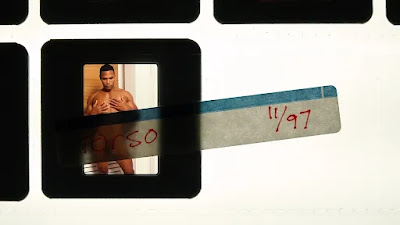three polaroid pictures, one with an erection
by Douglas Messerli
Frédéric Moffet (director) The Job / 2024 [15
minutes]
The real “job,” as Canadian photographer John
Phillips describes it, was finding the boys which he would take three color
polaroids of, all of them naked, at least one with a full erection. Although he
claims to have taken photos of all who showed up, he didn’t even way, in some
cases of the slow erection.
Having
moved to Los Angeles from Canada after being diagnosed as HIV-Positive, Phillips
suddenly felt he might not live long and needed, particularly as an illegal
alien in the US, to find a career which might allow him to support himself. If
he had once imagined himself as being a fashion photographer in the manner of
Herb Ritts, he was now reduced to finding appealing male erotica models for the
numerous gay magazines of the 1990s, the more liberated inheritors of the 1950s
and 1960s Beefcake mags.
It wasn’t
really the money for most of them, he recalls, but the ego, a sense that their
body, particularly their butts, penises, and faces might be worthy of being
included in the then popular mags of the day such as Playgirl, Playguy, Honcho, Fresh, Spurs, and Mandate.
In the
last year of his life, Canadian director Moffet interviews Philllips, who
reveals just how difficult to was being gay and HIV-Positive in the 1980s and
1990s, not only with regard to the homophobic elements outside of the queer
world, but within it where being HIV meant sudden ostracization.
He makes
it clear that his Hound Dog productions was not run as a casting couch, and
that perhaps only 4 or 5 times within the several hundreds of men he
photographed did he and his subject engage in sex.
Filmed
in 2023, the year of his death, Phillips, who kept control of his photos was
attempting to scan and post most of his archival photos, although given most of
the images the film shows us, most of these are not remarkable photos and often
not even significant erotica. But Phillips nonetheless felt some pride in
representing the vast range of gay men of that era and attempted, so he
declares, to create male erotica rather than porno, which he describes simply
as sex.
These
were many of the images in which people of my generation grew up with,
representing a truly more open attitude toward gay sexuality, despite the specter
of AIDS. And one might have imagined such a film to be provocative and
fascinating. Unfortunately, Moffet simply sets up his own camera and lets
Phillips talk between showing dozens of images of nude men with erections and
their butts pointing into air. And any of the true significance of such
photographic archives and their relationship to the queer society at large is
basically lost in the process of his almost tedious explanation of how he scans
his beloved images.
Despite
his aspirations, Phillips was no Ritts nor even Bob Mizner or Frederic Kovert for
that matter.
Los Angeles, October 19, 2024
Reprinted from My Queer Cinema blog (October 2024).




No comments:
Post a Comment